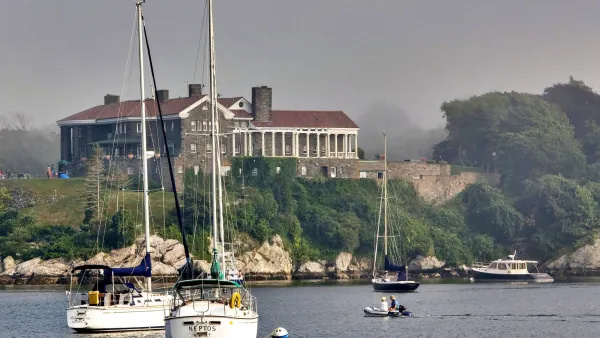Former Maryland Gov. Parris Glendening penned a local opinion for The Washington Post in support of the TCI to advance funding of alternatives to driving and ask readers to shape the controversial initiative by submitting comments by Feb. 28.

Parris N. Glendening, governor of Maryland from 1995 to 2003 and current president of Smart Growth America’s Leadership Institute, wants local readers of the Washington Post to address climate change by participating in one of the country's most important programs to target carbon emissions from driving, the Transportation and Climate Initiative (TCI), calling it "an opportunity to create more walkable and bike-friendly communities served by transit."
Regional leaders from 12 states and the District — from Virginia to Maine — are working collaboratively to develop a regional cap-and-invest system to reduce carbon emissions from the transportation sector and provide a new source of revenue for clean, climate-friendly transportation.
What we do in the Northeast and Mid-Atlantic region can be a model for success if we all work together. We undermine our economic, equity and climate goals by favoring new highways, roads and more lanes that induce more driving instead of transit, biking and walking.
According to the TCI fact sheet [pdf] explaining how the cap-and-invest program would work to reduce pollution, large gasoline and diesel fuel suppliers would have to purchase allowances based on the carbon intensity of the fuels they sell. In addition, a cap or upper limit would be set as to how much carbon pollution can be emitted from these fuels, which would be lowered in time, thus increasing the cost of the emissions, acting similarly to the CO2 allowance auctions operated by the Regional Greenhouse Gas Initiative for the power sector in the same Mid-Atlantic and New England regions.
Fuel suppliers, while not obligated, would likely pass on the allowance costs to consumers, which explains why TCI opponents call it a "gas tax." However, many if not most gas taxes, by law, must be spent on road improvement projects that designed to reduce traffic congestion, such as road widenings, thus increasing driving and emissions. TCI revenue would be used to do the opposite–reduce emissions.
Individual states would determine how to invest revenues, be it for electric vehicle charging infrastructure, public transit improvements, bike and pedestrian infrastructure, transit-oriented development, etc.
"Residents from across this area can offer their comments through Feb. 28 to shape the initiative," adds Glendening.
Related in Planetizen:
-
East Coast Considers Plan to Hike Gas Prices to Mitigate Climate Change, December 30, 2019
- Maryland's Smart Growth Law A Dud According To University Study (on Glendening's policies as governor), November 5, 2009
Hat tip to Kenyon Karl.
FULL STORY: We need better transportation options, not more roads and more lane

National Parks Layoffs Will Cause Communities to Lose Billions
Thousands of essential park workers were laid off this week, just before the busy spring break season.

Retro-silient?: America’s First “Eco-burb,” The Woodlands Turns 50
A master-planned community north of Houston offers lessons on green infrastructure and resilient design, but falls short of its founder’s lofty affordability and walkability goals.

Delivering for America Plan Will Downgrade Mail Service in at Least 49.5 Percent of Zip Codes
Republican and Democrat lawmakers criticize the plan for its disproportionate negative impact on rural communities.

Test News Post 1
This is a summary

Test News Headline 46
Test for the image on the front page.

Balancing Bombs and Butterflies: How the National Guard Protects a Rare Species
The National Guard at Fort Indiantown Gap uses GIS technology and land management strategies to balance military training with conservation efforts, ensuring the survival of the rare eastern regal fritillary butterfly.
Urban Design for Planners 1: Software Tools
This six-course series explores essential urban design concepts using open source software and equips planners with the tools they need to participate fully in the urban design process.
Planning for Universal Design
Learn the tools for implementing Universal Design in planning regulations.
EMC Planning Group, Inc.
Planetizen
Planetizen
Mpact (formerly Rail~Volution)
Great Falls Development Authority, Inc.
HUDs Office of Policy Development and Research
NYU Wagner Graduate School of Public Service





























